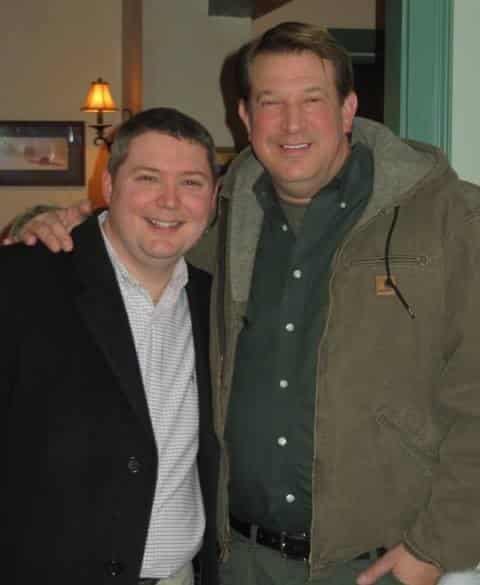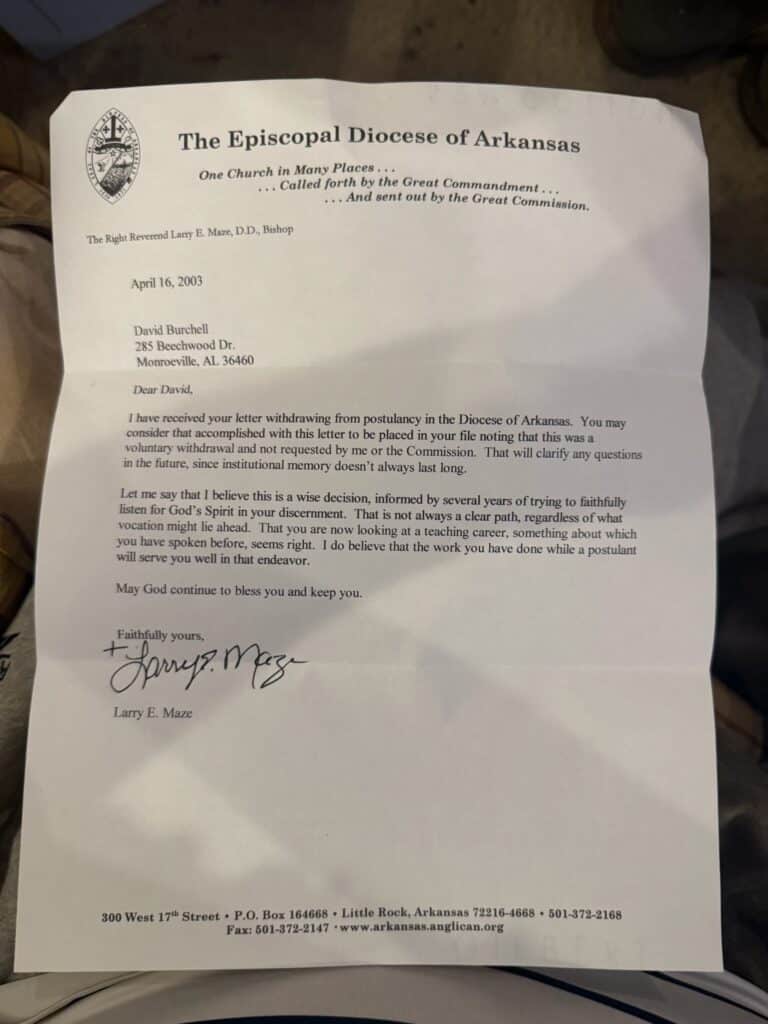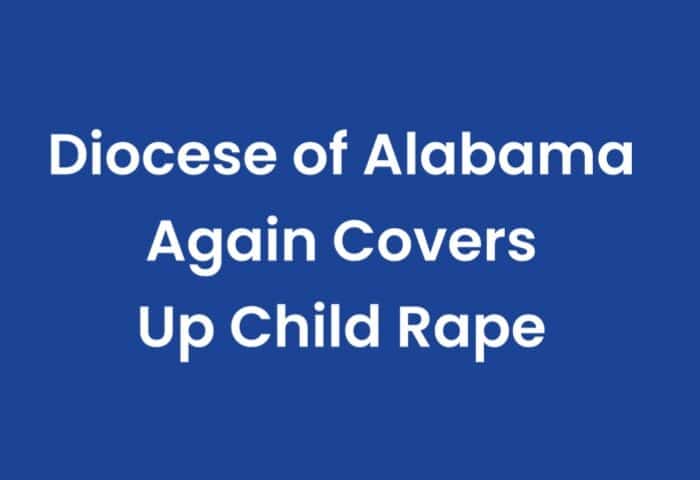It’s been a hectic last few weeks, and we apologize for the delay in posting and calling multiple people back. Nothing like health issues at home and the holidays to gum up the works.
Anglican Watch recently had the opportunity to speak with David Burchell, a victim of sexual assault and rape by the late Episcopal priest John Cruse.
We’ll go into the details in a moment, but for now, let’s just say that his experience underscores the profound corruption and dysfunction of the Episcopal Church and, more particularly, the Episcopal Diocese of Alabama.
Who is David Burchell?

Originally from Crossett, AR, David is the consummate Southern gentleman in every sense, including being consistently polite.
For many years, David struggled with his sexual orientation.
Fortunately, he appears to have worked through these issues, and he’s now happily married to another man, Darrell Johnston, whom he met through St. Dunstan’s at Auburn University.
But there’s an ugly and traumatic backstory to David’s experience.
David came to the Episcopal Church as a teen and attended St. Mark’s Church, located in his hometown of Crossett, AK.
Unfortunately, St. Mark’s rector, Fr. George Hart, verbally abused Burchell, but despite Hart’s behavior, David grew to love the denomination and its inclusive nature.
Things go sideways at St Dunstan’s
Things went sideways, however, when David went to Auburn University in 1997 and connected with the St. Dunstan’s community there.
Indeed, from where we sit, things followed a predictable pattern.
The rector of St. Dunstan’s, the late Rev. John W. Cruse, took an interest in David that extended to confiding in David, asking David to housesit for him, and more.
Predictably, Cruse steered the conversation to a variety of inappropriate topics, including porn and sex. As a result, David confided in Cruse about his struggles with his sexual orientation.
It comes as no surprise that the culmination of the grooming process came when Cruse invited David to his home for dinner. Included with the meal was that staple of Southern life, sweet tea, which Cruse appears to have spiked with a date rape drug.
Today, David remembers bits and pieces of the events that followed, which included being on the floor, sexual assault, penetration, and Cruse holding a knife to his throat, telling him that it was all his fault, and threatening to kill him if he ever told anyone.
David eventually made his way to his car and made his way home before calling his mother in despair, coming out to her, and telling her in very general terms about the sexual encounter.
Later, after fleeing to his mother’s home, David was relieved to discover that his mother and grandmother, who also lived there, were loving and supportive, encouraging him to contact the bishop—even though they didn’t know that the situation involved rape.
Coming forward — and running into a brick wall
By 1999, David had recognized the importance of coming forward and sharing his abuse.
Early in that process, David went to Little Rock to speak directly with Bishop Larry Maze, who was sympathetic and supportive — but quick to point out that he had no canonical authority over Cruse, and that the Episcopal Diocese of Alabama was the venue with jurisdiction.
From there, David contacted Alabama Bishop Henry N. Parsley, Jr., who was empathetic and had David come to the diocesan offices, meet with him, and while on-site, write out a statement about the rape.
Subsequently, the Diocese of Alabama called David, telling him that Cruse had admitted to the assault, but refusing to say anything beyond that.
Before we go further, we’re calling BS on the Diocese. By not sharing details with David, it’s not possible to know what Cruse actually admitted to, if anything. Moreover, rape is a criminal offense, and Anglican Watch has uncovered zero evidence that a police report was filed. Moreover, when Cruse died, his obituary still referred to as a priest.
Newsflash: Rapists should not serve as clergy. Full stop. No excuses, explanations, exceptions, or discussion.
In other words, the Diocese is morally liable and should be both held both criminally and civilly liable.
So, what did the Diocese do to make things right?
It provided a few counseling sessions to David and paid for his mileage. Nothing more.
Sorry, folks: Rape warrants more than a few meetings with a therapist. If this is the best the Episcopal Church can do, it’s a sorry day, both for the church and its members. In fact, it’s time to sell off the real estate, donate the proceeds to those of limited means, and call it a day.
Litigation and seminary
So how did David react to the Diocese of Alabama’s lame “pastoral response”?
Besides grief and anguish, he rightly consulted with an attorney, who offered to take the case on a contingency-fee basis and predicted a high likelihood that the matter would settle prior to going to trial.
But there was an obstacle: David felt called to go to seminary. And those in the know — including former rector George Hart and Bishops Maze and Parsley — told him he would not be able to go to seminary if he told anyone, or sued the church.
On that score, we’re calling BS on the Episcopal Church and the clergy involved in this situation:
1. Christians are called to bring light to the darkness. We cannot be in right relationship when we do not know the truth about the church and its clergy.
2. Those who suffer abuse at the hands of the church or its clergy should not have to sue to be made whole. Nor should they have to deal with the abusive conduct of the Church Pension Group (the church’s captive insurance carrier) and its deny, avoid, equivocate, and litigate approach when confronted by misconduct.
3. No one should have to choose between their wellbeing and the opportunity to serve the church.
4. The sort of behavior described above is called aiding and abetting. Recall: Cruse’s behavior is a felony.
Psychological fallout
The result of Cruse’s criminal conduct, combined with the Episcopal Church’s refusal to act with integrity in this matter, has caused predictable mental health issues for David, including bipolar disorder and post-traumatic stress disorder.
Nor has David ignored these challenges. He’s been diligent in getting mental health care, counseling, EMDR, and more.
Yet despite David’s diligent efforts, he continues to struggle. As a result, we expect he will soon be forced to file for long-term disability.
Seminary
Not surprisingly, David’s struggles with sexual abuse and the resulting PTSD/trauma impacted his time in seminary, despite a long-standing track record of academic success.
David’s seminary experiences began at Sewanee, where he struggled to succeed due to the inherent ongoing reminders of being sexually abused.
Following his decision to voluntarily withdraw from Sewanee, David tried again, this time at New York’s General Theological Seminary (GTS).
Regrettably, despite his obvious love for the church and his fellow human beings, David’s trauma again got the better of him, resulting in his withdrawal from GTS.

Diocese of Western Masschussets behaves badly
Still determined to find justice, David, then a resident of Holyoke, MA, filed a Title IV complaint with the Diocese of Western Massachusetts over his abuse during the Episcopal Church’s three-year suspension (2019-2021) of the canonical statute of limitations for sexual abuse.
The response was about what we’d expect: Cold and uncaring.
Not surprisingly, David became increasingly angry as the Diocese stymied his concerns, ultimately losing his temper and crying.
Even then, the Diocese was anything but compassionate, instead trying to shame David, and refusing to give him a copy of the “investigative” report.
Our guess is that the Diocese behaved like most Episcopal judicatories. Specifically, we suspect a phone call was made to the Diocese of Alabama, which responded with something along the line of, “Well, you know David has issues, and he’s been complaining about these issues for a long time—even after we paid for several counseling sessions!”
Of course, this approach sidesteps any meaningful or independent consideration of the underlying facts. And while we can’t say for sure that this is how the Diocese of Massachusetts handled the complaint, we’ve seen an identical fact pattern in so many cases that we’re can safely say it’s pulled straight from the Episcopal clergy misconduct playbook.
In addition, even if the perpetrator is dead, the matter should have been immediately referred to law enforcement.
If nothing else, anyone willing to rape another human being, has used illegal date rape drugs, and threatened to commit murder has almost certainly engaged in other illegal conduct. And this situation is doubly appalling when the perpetrator is a priest — a person who occupies a position of inherent trust.
Needless to say, the allegations have not been reported to law enforcement.
Sweet home Alabama
From there, David not surprisingly reached out the Episcopal Diocese of Alabama to find out what on earth was going on behind the scenes. His phone call was fielded by one of the great jackasses of the denomination, the now retired canon to the ordinary, Rob Morpeth.
For the record, Anglican Watch has dealt directly with Morpeth before and found him to be unresponsive and spectacularly ill-suited to ministry, let alone to serve as a canon to the ordinary.
As such, Morpeth was a suitable missional partner to the equally feckless, arrogant, and dishonest Glenda Curry, who continues to ignore multiple cases of misconduct within her diocese, including that of child rapist and Episcopal priest Richard Losch.
So what transpired during David’s call with Morpeth?
Suffice it to say, the answer is that Morpeth’s behavior was anything but Christlike and included:
- Telling David that he was lying.
- Accusing David of being a “fake,” whatever the heck that is supposed to be.
- Hanging up on him.
Indeed, during the all-too-brief call, the then-bishop diocesan was heard to say in the background that the Diocese would not get involved.
That approach of, “I don’t want to get involved,” is all too common in the denomination, and makes a mockery of the church’s claims that it opposes abuse, and that church canons have any relevance to the actual governance of the church.
The Episcopal Church piles on
There’s another disturbing aspect to this case, and one that is a given in any case of abuse within the denomination, and that is the alacrity with which all levels of the Episcopal Church have tried to silence David and punish him for speaking out about criminal conduct.
Specific examples of the church causing added trauma include:
- The previously cited examples of Rob Morpeth’s unacceptable and abusive behavior.
- Bishop Maze, in his role at Sewanee, challenging David by asking, “What is wrong now?”
- Bishop Maze telling David that, if he left a meeting with him, to never come back.
- Rector George Hart, from David’s childhood parish, telling him he must never discuss being raped, and that, if he filed a lawsuit, he was “money hungry”
- Bishops Maze and Parsley demanding silence.
- Church members shunning/ostracizing David and criticizing him for speaking out, aka rocking the boat.
To be clear, these are just a few examples of the church’s unethical response to the victim of criminal conduct by clergy, and we could cite many more examples.
What would justice look like?
There is nothing the church can do to punish the perpetrator, John Cruse, who has died and presumably gone to wherever rapist priests go in the afterlife. There is, however, much that the Episcopal Church can do to fix the situation.
- It can start by recognizing that the canons and their statute of limitations are irrelevant in this situation. Rape is rape, and the highest priority is caring for the victim, not shielding the denomination from legal liability or conserving the Church Pension Group’s billions of dollars in cash. That’s how Jesus would handle the situation, and it’s how the church needs to respond.
- The church can drop the BS excuses, backroom chatter, and furtive phone calls within the Pointy Hats Club, aka the House of Bishops, and take the matter seriously. That means actually listening to David, hearing what he’s saying, and assuming he’s telling the truth. To be clear: False reports of rape are very rare, and there is zero reason to conclude that David is not credible.
- The church needs to stop using David’s PTSD and other trauma, which it caused, in an effort to discredit him. This behavior is unacceptable.
- The church needs to act with transparency. When someone is the victim, the whole bit about an investigatory report being confidential goes out the window. That approach is consistent with Title IV, which allows a bishop diocesan to waive confidentiality to address pastoral needs. (Canon IV.8.3) Further, rapists enjoy no privacy interest, and all involved should feel free to quote us.
- The church can tell the truth. That means disclosing what Cruse did, who knew about his misconduct, and what the church did — and didn’t — do to address his criminal conduct. To be clear: We have evidence of other potential misconduct by Cruse, so a full investigation and referral to law enforcement are required.
- The church can pay for, or otherwise making possible, meaningful mental health care for David. It’s called restitution, and it’s a requisite part of repentance according to the Christian faith.
- The church can hold Rob Morpeth and others involved accountable for their conduct. The tired routine of “mistakes were made and we’re sorry” isn’t going to cut it. And we’re tired of the church playing fast and loose with its own corruption
- Finally, the Episcopal Church can and must make clear to all involved, including people in the pews, that victims of rape and other criminal conduct by clergy who come forward are not the enemy.
In closing:
- A quick note to the inevitable lawyers: Put the word “alleged” in front of every assertion in this post. These are allegations and have not been proven in a court of law; all persons, including Cruse, are presumed innocent as a matter of law until found guilty by a court of competent jurisdiction. Anglican Watch has, however, spoken directly with David and find him to be credible. We have confirmed key aspects of his allegations with third parties and have run a background check on him to verify specific dates and times. We therefore believe David without hesitation or reservation, and are mindful that his primary reason for coming forward is to help others.
- Our heartfelt prayers go out to David, his husband, and all who have been hurt by the Episcopal Church, both through things done and left undone.
- We commend David for his courage in coming forward. Reaching out to a complete stranger takes courage, and even more so when in trauma—and when the Church has done everything in its power to minimize, deny, avoid, and deflect David’s anguish.
- Anglican Watch calls on the Episcopal Church, the Dioceses of Alabama and Western Massachusetts, and all involved in the evil and abusive mishandling of this case to repent.
- We hope that this article, in some small way, brings healing and closure to David, his husband, his family, his friends, and all who love him.


Typo alert – “David came to the Episcopal Church as a teen and attended St. Mark’s Church, located in his hometown of Crossett, AK.” AK should be AL (AK = Alaska)
Thanks so much—it’s been quite the week.
We have a few more minor errata on this piece:
Per David:
Two things-I left Sewanee and went to Episcopal Divinity School in Cambridge, MA, and I meet Darrell at All Saints Episcopal Church in Mobile, Alabama, August of 2009.
We apologize for the errors.